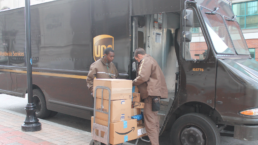As peak package season approaches, their union is gearing up for what could be the largest strike against a single company in U.S. history next year.
by Teddy Ostrow, The New Republic
The holiday season is upon us. The day after Thanksgiving, Black Friday, will yet again mark the beginning of the most wonderful time of the year: a surge in e-commerce spending, gifts galore delivered right to our doorsteps. That is, of course, if you’re not employed by United Parcel Service, better known as UPS, forced to work brutal six-day, 60-hour weeks—for two straight months—making sure Amazon-addicted Americans receive their presents on time.
“Drivers know peak season sucks. You’re gonna get that overtime, whether you like it or not,” Jared Hamil, a UPS package driver in Los Angeles, told me. 2020 was especially tough. Pandemic death, disease, and capitalism increased package volumes while taking huge numbers of people out of the workforce, crushing workers across the already pinched logistics industry.

But after the peak of 2020 ended, something strange happened. In many UPS hubs, the grind never slowed. “Once Covid-19 happened, things turned around and it was peak season all year long,” Hamil said.
UPS workers across the country have told me the same thing. When the new year turned, the six-day weeks dragged on, taking a physical and mental toll on workers, who struggled to have a life outside of work; to make dentist appointments; to see their spouses and children without the fatigue of 12-hour workdays. Without sufficient staffing, the barely tolerable seasonal crunch at UPS transformed into an intolerable chronic squeeze. “It’s been nonstop,” said Steve Dumont, a 12-year veteran of “Big Brown” in Williston, Vermont. “It’s literally been like Christmas peak season for the last three years.”
Next year, however, these workers may finally win some relief. The collective bargaining agreement, or CBA, between UPS and its workers, who are unionized with the International Brotherhood of the Teamsters, is set to expire at the end of July, and forced or excessive overtime will be a central issue. The UPS national CBA is the largest private sector labor contract in the country. And with a militancy in the union not seen since the 1990s, the Teamsters leadership has warned UPS that it isn’t afraid to call a strike. With a nearly 350,000 strong workforce, it would be the largest strike against a single company in U.S. history. Transporting 6 percent of the country’s GDP, these logistics workers have incredible leverage.
Recent Posts
‘Unconstitutional. Unethical. Authoritarian.’ ICE Bars Millions Of Immigrants From Bond Hearings
July 18, 2025
Take Action Now One watchdog said the new policy “seems like a blatant attempt to stop them from exercising their right to due process.”……
Americans Are Not Nearly Alarmed Enough About Climate Change
July 18, 2025
Take Action Now Americans still don’t comprehend how imminent, dangerous, and far-reaching the threat is—and journalists are partly to blame.By…
The IRS Is Building A Vast System To Share Millions Of Taxpayers’ Data With ICE
July 17, 2025
Take Action Now ProPublica has obtained the blueprint for the Trump administration’s unprecedented plan to turn over IRS records to Homeland Security…
Israel’s Sudden Assault On Syria Is Unchecked Aggression
July 17, 2025
Take Action Now Jerusalem is bombing Damascus and threatening al-Sharaa’s rule, while Washington was hoping to help the nascent government on…




